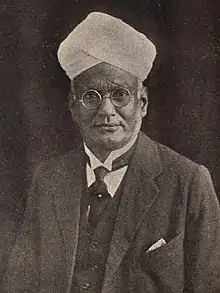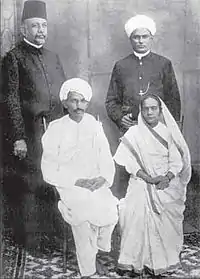Ganapathi Agraharam Annadhurai Ayyar Natesan | |
|---|---|
 G. A. Natesan in 1933 | |
| Born | 25 August 1873 |
| Died | 29 April 1948 (aged 74) |
| Occupation(s) | Writer, Journalist, Politician, Publisher |
| Spouse | Mangalamma |
Ganapathi Agraharam Annadhurai Ayyar Natesan (25 August 1873 – 29 April 1948) was an Indian writer, journalist, publisher, politician and freedom-fighter from the erstwhile Madras Presidency. He was the founder and proprietor of G. A. Natesan & Co. which published nationalist books, the most prominent among whom was The Indian Review.
Early life
Natesan was born in the village of Ganapathi Agraharam in Thanjavur district on 25 August 1873. He had his schooling in Kumbakonam[1] He graduated in arts from the Presidency College, Madras[2] and started a career as a publisher. He first apprenticed under Glyn Barlow before starting his own publishing company, G. A. Natesan & Co. in 1897.[2][3]
Indian independence movement

Natesan was involved with the Indian independence movement right from his early days. In 1900, he started The Indian Review, a monthly publication in English.[4] While covering mostly nationalistic themes, The Indian Review also included literary reviews, illustrations and sections on economy and agriculture.[4] Natesan advertised on the front page that his publication was "devoted to the discussion of all topics of interest".[4]
When Mahatma Gandhi visited Madras for the first time since his arrival in India in 1915, he stayed at Natesan's house at Thambu Chetty Street, Georgetown.[5][6] His stay lasted from 17 April 1915 to 8 May 1915.[6]
Later life
In his later life, Natesan underwent a change of ideology and joined the Indian Liberal Party.[7] He was elected Joint Secretary of the Liberal Party in 1922.[7] He was first nominated as a non-official member to the Council of State in 1923 and for a second time in 1931.[7][8] During his tenure as a member of the Council of State, Natesan served as member of the Indian Delegation to the Empire Parliamentary Association in Canada.[1] He also served as the member of the Indian Iron and Steel Tariff Board in 1933-34.[7][9] Natesan was appointed Sheriff of Madras in 1938.[7]
Death
Natesan died on 29 April 1948 at the age of 74. He was extremely active until the time of his death.[1]
Notes
- 1 2 3 Siba Pada Sen (1972). Dictionary of national biography. Institute of Historical Studies. pp. 245–246.
- 1 2 World biography. Institute for Research in Biography. 1948.
- ↑ Diamond jublee: sixty years of publishing, 1897-1957. G. A. Natesan & Co. 1957. p. 39.
- 1 2 3 Somerset Playne; J. W. Bond; Arnold Wright (1914). Southern India: its history, people, commerce, and industrial resources. pp. 733.
- ↑ "The Mahatma: Gandhi and Kasturba". Gandhi Ahsram at Sabarmati. Archived from the original on 6 February 2009.
- 1 2 "When Gandhi visited Madras". The Hindu. 26 January 2003. Archived from the original on 20 June 2003.
- 1 2 3 4 5 Clarence Lewis Barnhart; William Darrach Halsey (1980). New Century Cyclopedia of Names. Simon & Schuster. p. 2892. ISBN 0136119476, ISBN 978-0-13-611947-0.
- ↑ B. Natesan (1933). Souvenir of the sashtiabdha-poorthi of the Hon. Mr. G. A. Natesan. G. A. Natesan & Co. p. 55.
- ↑ Great Britain. Commercial Relations and Exports Dept (1935). India: economic and commercial conditions in India. H.M. Stationery Off. p. 76.